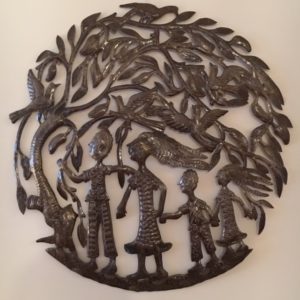
“If everybody loved flowers, there would be no war.” That’s what George Psailas, the caretaker of the British cemetery on the Greek island of Corfu told me and the English-speaking visitors I brought to see the rare wild orchids that grow in the graveyard. I just smiled, thinking something had been lost in translation. I love a wildflower as much as the next tree-hugger, but it seemed a bit of an overstatement that if you care about nature, you’ll overcome the drive to hate, kill, and dominate.
Later, George showed me a grave marker with his name on it, under a shady tree. He was born in the house on the cemetery grounds, because his father was caretaker before him. And he’s already reserved this spot for when it’s his turn to be buried, because even in death, he wants to be able to watch the seasons change.
That’s when I understood a bit more what he means—that if you strive to look for beauty, even when surrounded by evidence of human frailty and your own morality—it changes who you are. The instinct to destroy weakens as the drive to celebrate good strengthens. Sure, George, who grew up protecting the wild orchids and stray cats who live in the cemetery, has tunnel vision when it comes to flowers. But, I thought, he’s onto something.
Since the shooting at the Tree of Life synagogue on Saturday, October 27th, when a white supremacist gunned down 11 Jewish people, most of them elderly, in their spiritual home, I’ve been feeling a bit like George Psailas. Because the minute I heard the name of the synagogue, I thought: If everybody knew folklore, there would be no war.
The gunman hated those old people, who had lived lives devoted to making contributions to society, because he felt they were different from him. And yet, the purpose of their synagogue’s charity work was to help others, no matter their background.
Still, it was the name that got me. My upcoming book has a chapter on lucky folkloric symbols. In it, I write,
Another natural symbol that’s universally understood as auspicious is the tree of life. It calls to mind a family tree, rooted in the past but spreading toward the future and up to the heavens. The Koran refers to the Tree of Immortality, and in the Bahá’í text The Manifestation of God, it is written, ‘ye were all gathered in My presence beneath the shade of the tree of life, which is planted in the all-glorious paradise.’ Virtually every indigenous group in the Americas, from the Aztecs to the Zunis, holds trees sacred
All over the world, different cultures find specific types of trees auspicious. Hindus favor a banyan while Buddhists believe that the Buddha was born under a pipal tree, making it lucky. Orthodox Christians view cypress trees as representations of souls ascending to heaven and plant them to mark sacred sites. Norse mythology refers to the Yggdrasil, or “world oak,” which may be a yew, an ash, or the oak tree sacred to the god Thor. And fruiting trees are a global symbol of fertility.
That’s what I love about folklore—it’s so specific, but so universal. Each culture manifests its hopes in different ways, but we all hope for the same things. The past two years have been such dark ones for our country, with so much hatred and violence being fostered. It was a comfort to me to be working on a book of folklore devoted to bringing luck to couples getting married because, as I collected customs and rituals and toasts from all over the world, I began to feel that deep down, we all want the same things: For our children to be happy. To have the chance to offer hospitality to others. For future generations to continue.
I don’t know what makes it impossible for people like our “president” and the gunman, whom I refuse to name, to understand this.
I hate that this needless tragedy happened, but I take comfort in the fact that the community that was affected is named for the Tree of Life, which can never be destroyed or uprooted. I know that this specific Tree of Life will continue to grow.
This morning I watched a video of a young man who grew up in the Tree of Life community, in which he explains that the synagogue is devoted to public service and the Jewish ideal of tikkun olam, which literally means “to repair the world.” Today is election day, which gives each of us a little chance to do just that. I can’t wait to go out and vote for candidates who feel we’re all different branches of the same world tree.